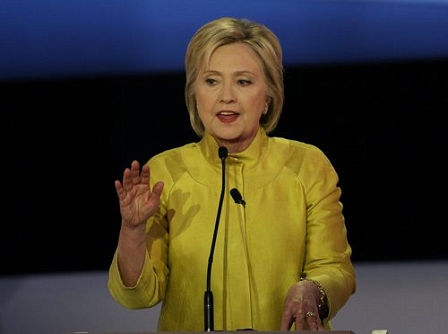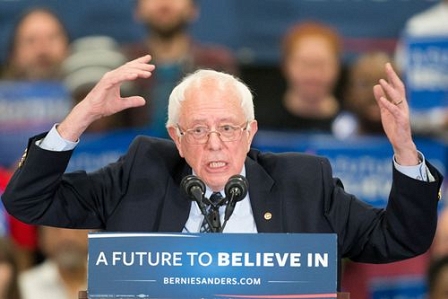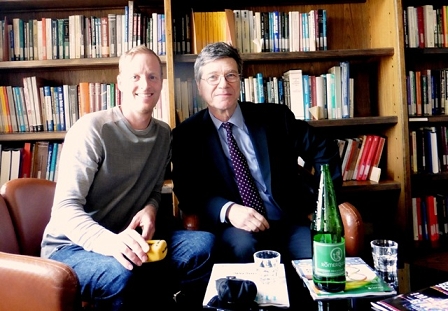Erstellt am: 15. 4. 2016 - 12:12 Uhr
Hillary Clinton is the "war candidate"
In Brooklyn, New York, last night there was a fierce and bruising debate between the two Democratic presidential hopefuls Hillary Clinton and Bernie Sanders.
They clashed over Wall Street banks, gun control and their respective voting records over recent American military engagements. Sanders pointed out that Clinton had backed the US-led war in Iraq which he called "the worst foreign policy blunder in the history of the USA".
Sanders' view has had some prominent backing from one of the world's most renowned economists, Jeffrey Sachs who I met this week in Laxenburg at IIASA - the International Institute for Applied Systems Analysis - where he is a visiting fellow.
Sachs has fiercely attacked called Hillary Clinton, calling her "the war candidate" - I asked him what problem he had with Clinton?
Jeffrey Sachs: My main problem is her role in foreign policy over the years which, in my opinion, has been aiming towards too many wars and too many militarized policies, as opposed to what I would regard as the use of diplomacy. She was a strong supporter of the Iraq war, she was a strong supporter of the Libya war, she was a strong supporter of the Syrian war, all of which, I believe, were US policies that were mistaken and that aggravated the crises of the Middle East.

AFP / Tasos Katopodis
Her defenders would say that’s because she’s a champion of human rights, and all these regimes were abusing human rights.
If you look at the consequences of the proposals that she supported, it’s done nothing to protect people, it’s caused devastating bloodshed, mass dislocation, and a tremendous amount of instability. So, I think policies have to be judged on their performance, and these have been very bad policies.
You’ve called her "the war candidate" and also of being part of what I think you called the "military industrial complex".
The term "military industrial complex" isn’t mine; it goes back to Dwight Eisenhower who, though a general, as president warned the American people about the power of the national security apparatus in the United States.
After all, the US is the most powerful military in the history of the world, and it has given tremendous power, over time, to the role of the military and the intelligence community in American foreign policy, and in American policy in general.
President Eisenhower warned about the excesses that would result from that, and I think one of the excesses is an excessive number of wars. It is also the case that our very way of thinking about the outside world became militarized over time, so that when we see a problem in the United States, the security establishment tends to look for a military approach. President Obama made this point in a recent interview in Atlantic monthly, where he talked about the fact that there is a standard "playbook", as he called it, of the security establishment, and it’s pretty much a militarized playbook.

AFP / Geoff Robins
I am sure there are Europeans who’d like to see a President Trump, but I’d say that most Europeans are worried about the possibility of Donald Trump winning the United States presidency, and many people have seen Hillary Clinton rather than Bernie Sanders as the more mainstream candidate who is more likely to beat Trump.
Well, if you look at the opinion surveys of a head-to-head race, Bernie Sanders does at least as well, if not better, in head-to-head races, because Hillary Clinton has a lot of negative sentiment in the United States. So, I don’t think that it’s right to think that the Democrats should necessarily nominate Hillary Clinton, though she is the odds-on favourite on the grounds that she’s the most likely victor in the fall (autumn). I don’t think that’s what the evidence suggests; the evidence suggests that either she or Sanders would most likely beat Trump.
Sanders has been called an idealist, and sometimes that word has been used as a criticism, something to hold against him. Do you think it should be?
You know, the American people really are tired of the cynicism and the corruption of our politics. And of the huge money influences, the role of Wall Street in financing the campaigns, and the role of other lobbies in financing the campaigns. That’s why young people, in particular, are really flocking to Bernie Sanders because, maybe the older people aren’t reading all the social media the same way, or just are more used to this, but young people are saying they want a different kind of politics. I think it is very important to understand what they are really attracted to with Sanders, and that is that he’s not purchased by major lobbies, he doesn’t carry the foreign policy baggage that Hillary Clinton does, so he has got a lot of support. It’s a competitive race for a reason; he came out of almost not being known at all on the national scale, to attracting a tremendous amount of support, because people want a change.
It is interesting that you bring up the relationship between money and politics, because there have been demonstrations this month in the USA about the large role that money plays in politics. Of course, it plays a role in most countries, but is it particularly so in the USA?
Well, the US has more billionaires, and those billionaires give money, and they really call the shots in the United States to a remarkable extent, these days. Serious political science research has shown that it is only the views of the richest Americans that actually gets translated into public policy. On many, many issues, the public may be for, or against, something - but it doesn’t really matter if the rich are against it. For example, the majority of Americans have long wanted higher taxes for the rich, but the rich have been able to stop that; the average American has wanted action on climate change, but the oil lobby has been able to stop that; most Americans have been against these wars, but the establishment has been able to override that. So, the challenge of democracy, if it is a functioning democracy, is to translate the public will into public policy. But in the United States there has really a breakdown of that process now, because it has only the views of the rich and the powerful lobbies that really gets translated into public policy.

Katherine Leitzell
You might say it has always been like this. How would you go about dismantling the relationship between big money and big power.
It got a lot worse in the last ten years because our Supreme Court, for completely strange argumentation, overthrew all of the legislative guard rails on money and politics, and the court said in a famous opinion called "citizens united", that if it is not directly a payment as a quid pro quo for a specific policy vote, you wouldn’t call it corruption.
But most Americans are a lot more sophisticated than those Supreme Court judges. Or they were being deceitful, we don’t know really which, because we know that if large donors give money it is going to influence policies. Not as a direct quid pro quo in an immediate sense, but through all the methods of influence that exist.
So, Americans are pretty aghast at how this works, and it has gotten a lot worse in recent years. The expenditures on elections has soared, and that’s because the big candidates have billionaires behind them. Hillary has her billionaires that give money to support her, and other candidates have their billionaires, and the rest of Americans look on and say: "Are you kidding, this is called a democracy?" Then when someone like Sanders says, "I’m going to run on small donations, I’m not going to take this big money", the establishment media says, "Oh, look how idealistic he is!", as if cynicism is a standard we should insist on in our politics.
Is there one law you could write that would solve this problem, and if you did write the law, could it be passed?
Right now, it could probably not be passed, because the incumbents have such an advantage of getting money from large companies, and from millionaires and billionaires. They’ve rigged the system. So, this is a system not for the Democrats or the Republicans, so much as for the establishment and the incumbents, and that is why they don’t write laws, because they don’t want to give an equal playing field to those who would come to compete with them.
So, what Bernie Sanders is trying to do is something else. He’s saying, "I’m running without taking big donations. My opponent is on the take from big donations. She’s together with this financial industry that has done so much damage to the American people. Vote for me, and you’ll have a politician who isn’t beholden to these lobbies." And it’s showing that this is an effective way to proceed. Whether he makes it or not is a close call, he’s definitely a competitive candidate, but it is showing how much distaste there is for this kind of politics. Somebody is going to crack this code, and be able to win on that basis.


